Three months of absurdity and torture of UOJ journalists: For what?
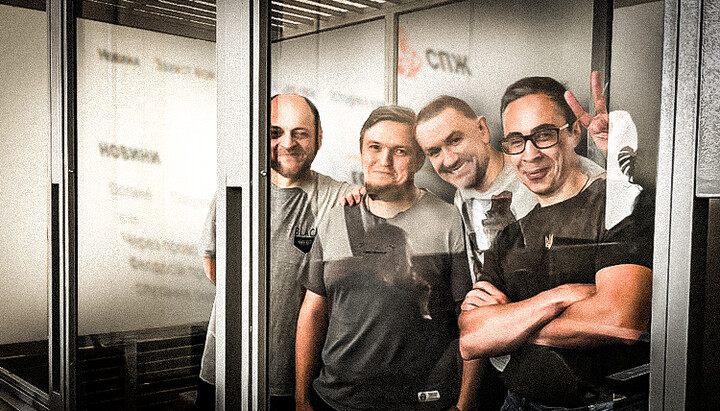
On June 12, 2024, it had been three months since Orthodox journalists and a priest were imprisoned. What exactly are they accused of?
In cases like these, where people are arrested and charged with the most serious crimes, ordinary people might wonder: could it be that they really committed all these grave offenses? Maybe an innocent-looking journalist (or turner, baker, doctor...) was actually an agent of the Russian (Japanese, German, Chinese...) intelligence? Maybe the SBU and the prosecution know something we don’t? In the case of the arrested priest Serhiy Chertylin and journalists Valeriy Stupnitsky, Andriy Ovcharenko, and Volodymyr Bobechko, such suspicions might also arise: "they probably wouldn't be put in a pre-trial detention center for six months for nothing." Let's delve into this issue using specific documents and statements made by the participants in the process during court hearings.
Here is the "Suspicion" presented to one of the suspects. It should be noted that the "Suspicions" for almost all suspects are almost identical, with only minor changes in personal data and some other details.
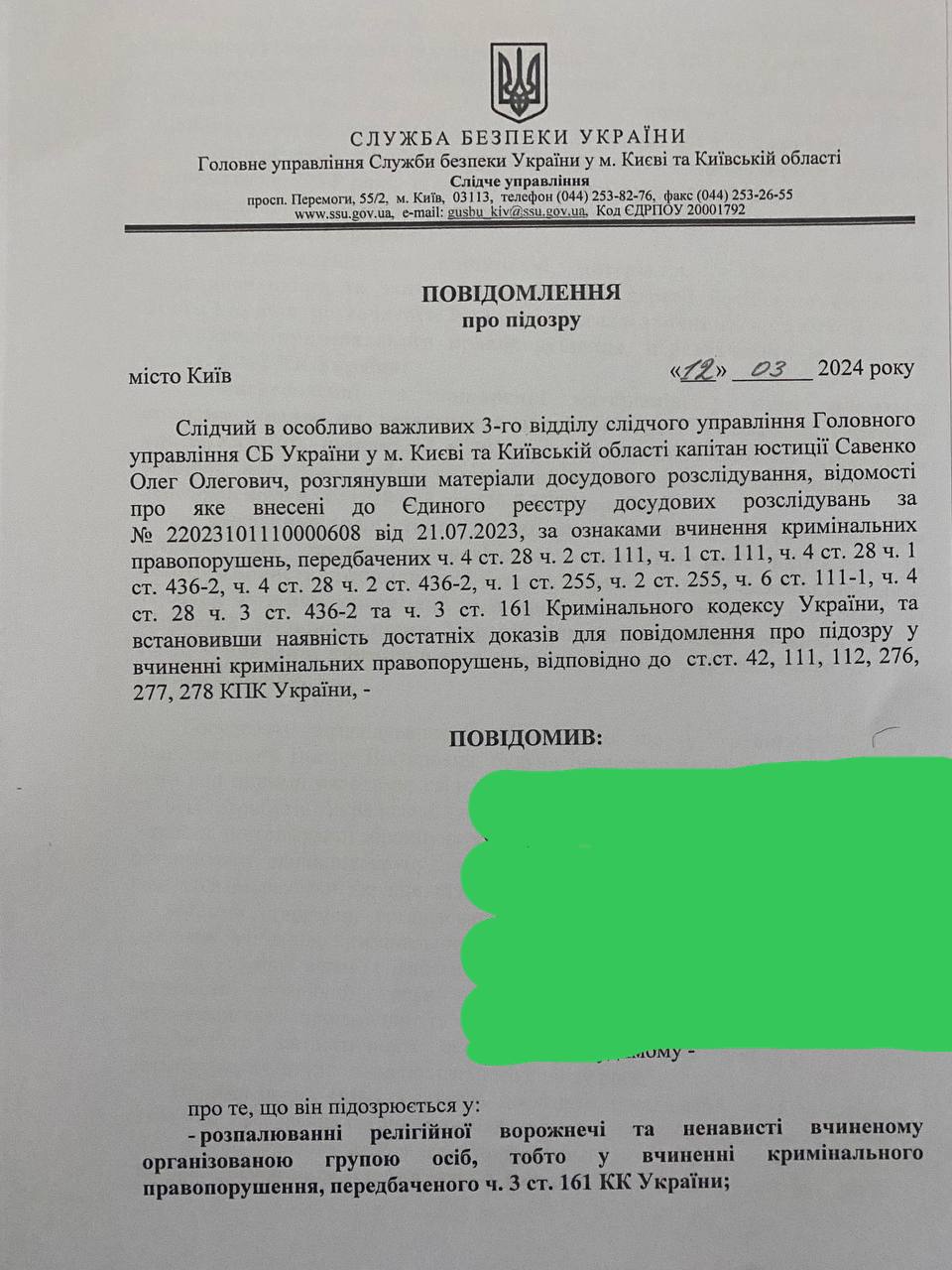
By the way, it's easy to see that one person wrote the day, and another wrote the month. Yet, that's not the point.
The person who received the "suspicion" is accused of the following crimes:
- Inciting religious hatred (Article 161 of the Criminal Code of Ukraine (CCU) – up to 8 years of imprisonment);
- Participation in a criminal organization (Article 255 of the CCU – up to 20 years);
- Justification and denial of Russian armed aggression (Article 436-2 – up to 8 years);
- High treason (Article 111 – up to life imprisonment).
OCU – a state attribute, while UOC – "incorrect"?
In other words, these are some of the most severe crimes in the Criminal Code, with the harshest punishment being life imprisonment. It would seem that such serious charges should be supported by equally serious evidence. Let's delve into this in more detail. However, before we examine the specific charges, we need to address the cornerstone of them all, which is what the SBU investigators rely on when presenting such serious accusations. This is the recognition that the Orthodox Church of Ukraine (OCU) is an attribute of the Ukrainian state, and therefore, any criticism of it should be considered an attack on Ukrainian statehood. Honestly, when this argument was made during the court session, the first thought that came to mind was that it was simply a mistake by the prosecutor, given how absurd this assertion is. But it turns out, this is literally contained in the "Suspicion".

It is worth recalling that according to Article 20 of the Constitution of Ukraine: "The state symbols of Ukraine are the State Flag of Ukraine, the State Emblem of Ukraine, and the State Anthem of Ukraine." And according to Article 35 of the Constitution: "The church and religious organizations in Ukraine are separated from the state, and the school is separated from the church. No religion shall be recognized by the state as mandatory." With such clear and unequivocal provisions in the Constitution, it is unimaginable to claim that the OCU is a state attribute. But SBU investigators not only assert this but also base their accusations on it, which has kept Ukrainian citizens behind bars for three months, risking their imprisonment for life. We won't even comment on the statements about the "superiority of the Russian nation", as it is evident nonsense.
In the "Suspicion" presented to Fr. Serhiy Chertylin, the prosecutor even accused him of belonging to an "incorrect" religious organization. Here is a quote from the lawyer's statement during the hearing on the prosecutor's disqualification: "...when the suspect is a priest of one religious community, which, as the prosecutor claims, is the WRONG religious organization, and this is explicitly stated in the suspicion notice and in the request for the continuation of the pre-trial investigation. Since it is only about the correct religious organization, the OCU, which, according to the prosecutor, embodies an attribute of Ukrainian statehood. And the UOC, which is a legitimate religious organization in Ukraine, to which the suspect Fr. Serhiy belongs, is effectively outlawed, in the prosecutor's opinion. Therefore, with such an attitude towards the religious situation in our country, this prosecutor has no place in this case."
In any civilized country, if a prosecutor dared to officially classify registered religious organizations as correct or incorrect, they would not only be excluded from the case but also dismissed from public service. But here, the judge calmly rejected the lawyers' motion to disqualify the prosecutor.
Inciting religious hatred?
Now, let's look at the specific charges. Article 161 of the Criminal Code of Ukraine: "Violation of the equality of citizens based on their racial, national, regional affiliation, religious beliefs, disability, and other grounds."
The definition of this article is as follows:
"1. Intentional actions aimed at inciting national, regional, racial, or religious enmity and hatred, degrading national honor and dignity, or insulting citizens' feelings in connection with their religious beliefs, as well as direct or indirect restriction of rights or the establishment of direct or indirect privileges for citizens based on race, skin color, political, religious and other beliefs, gender, disability, ethnic and social origin, property status, place of residence, language or other grounds."
The journalists could not have restricted anyone's rights, so what's left are "intentional actions aimed at...". Maybe they insulted, slandered, or otherwise attacked representatives of the OCU? No, the "Suspicion" does not mention this. The journalists are accused of news publications, i.e., reports on specific facts or statements made by third parties. There are more than 30 such publications mentioned in the "Suspicion." Here are some examples.
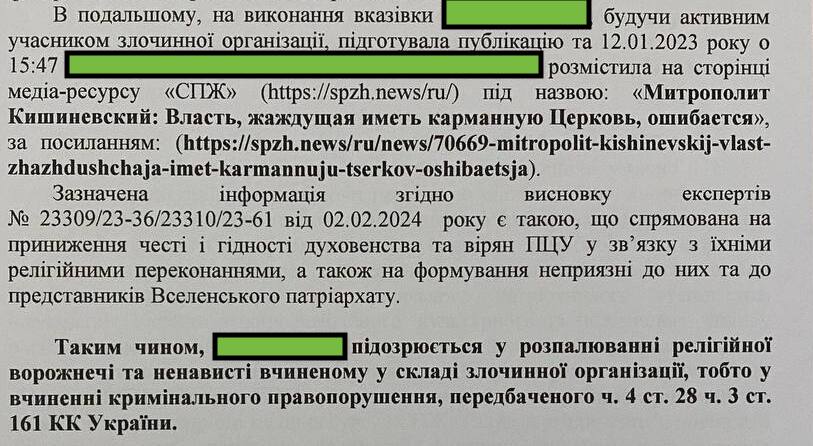
Anyone can read this publication and see that there are no signs of inciting religious hatred according to Article 161 of the Criminal Code of Ukraine. First, the criticism is directed at the Ukrainian authorities, not any religion or its representatives. Second, there are no insults or false statements in it. Third, it is simply a news report on the statement of a public figure, the Metropolitan of Chisinau. What kind of guilt can there be for a journalist who is honestly and diligently doing their job?
Moreover, while this publication indeed contains criticism, albeit from a third party, many others are simply reports on events that took place.
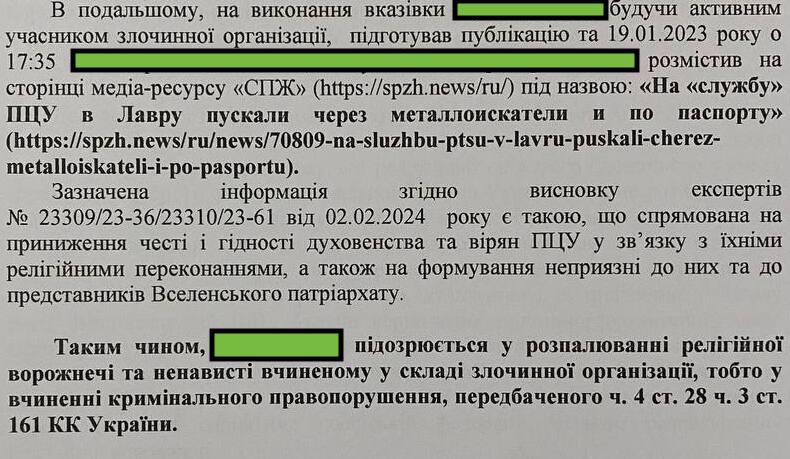
Everyone who was present at this event saw that entry to the Lavra was indeed controlled with passports and metal detectors. TV channels broadcasted this live. Here is a screenshot from the YouTube channel "5 Kanal".
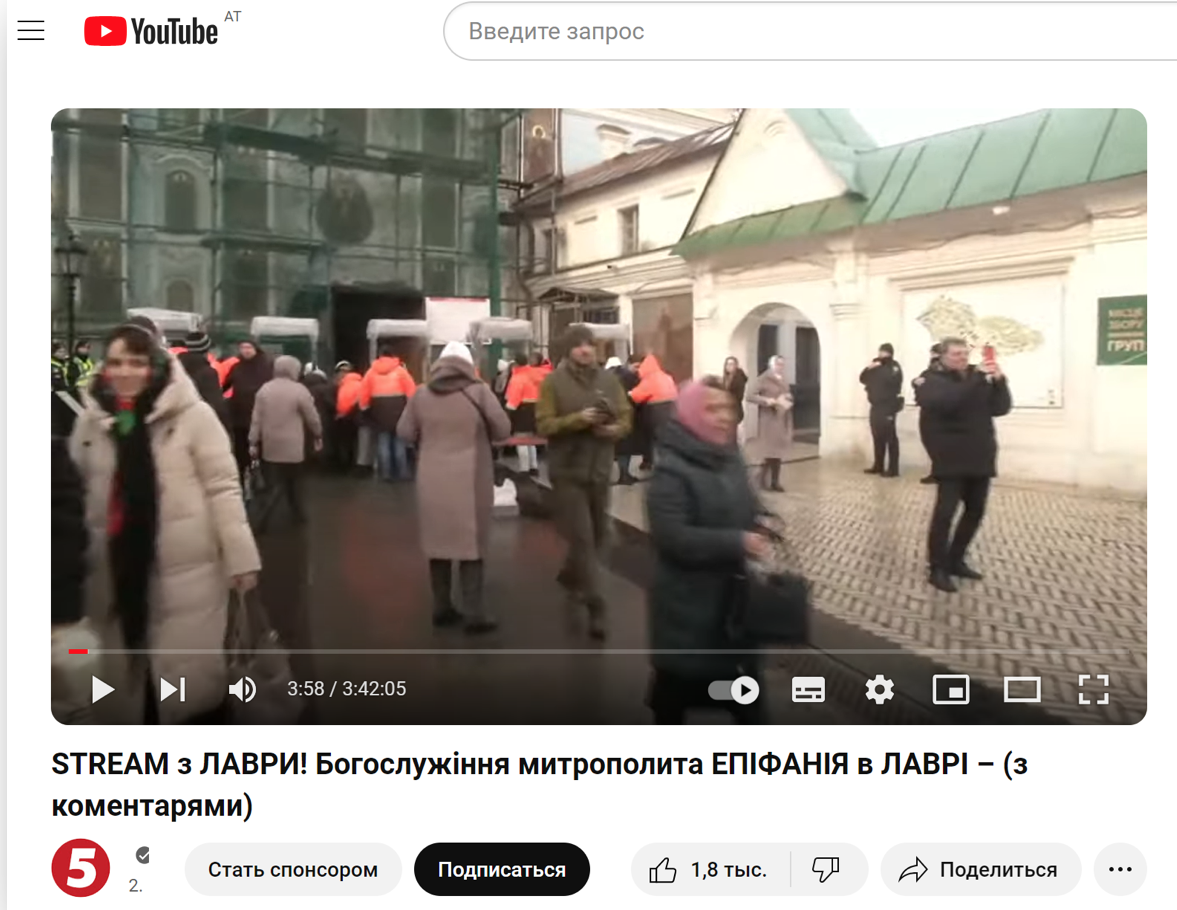
It is clearly visible that entry to the Lavra was indeed through metal detectors. How reporting this can be considered inciting religious hatred is unclear. And why are the 5 Kanal journalists free while UOJ journalists are in jail for the same thing?
The most absurd part is when journalists are blamed for honestly reporting on the outrages against UOC believers.
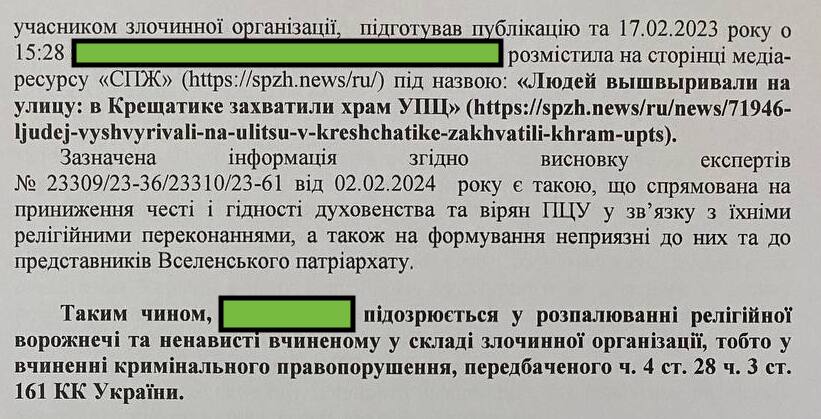
There is ample evidence that people were indeed thrown out onto the streets: witnesses, photo and video recordings, reports to law enforcement agencies, and so on. But according to the SBU's logic, it was not the people committing these acts who incited religious hatred, but the journalists who reported on them.
It is astonishing, but all the accusations against the journalists are based on news publications. The "Suspicion" does not even include a single analytical article containing evaluative judgments and interpretations of facts. Just news. This is completely normal journalistic activity, the kind that journalists engage in worldwide. How this can be a criminal offense in Ukraine is unclear.
As for the experts who deemed all these materials as inciting religious hatred, their competence and bias are clearly demonstrated by the fact that, while accusing Fr. Serhiy Chertylin of spreading "Russian narratives", they attributed to him the phrase "aggressive NATO" instead of "aggressive crowd," which he actually used when commenting on the expulsion of a UOC priest and children from their home.
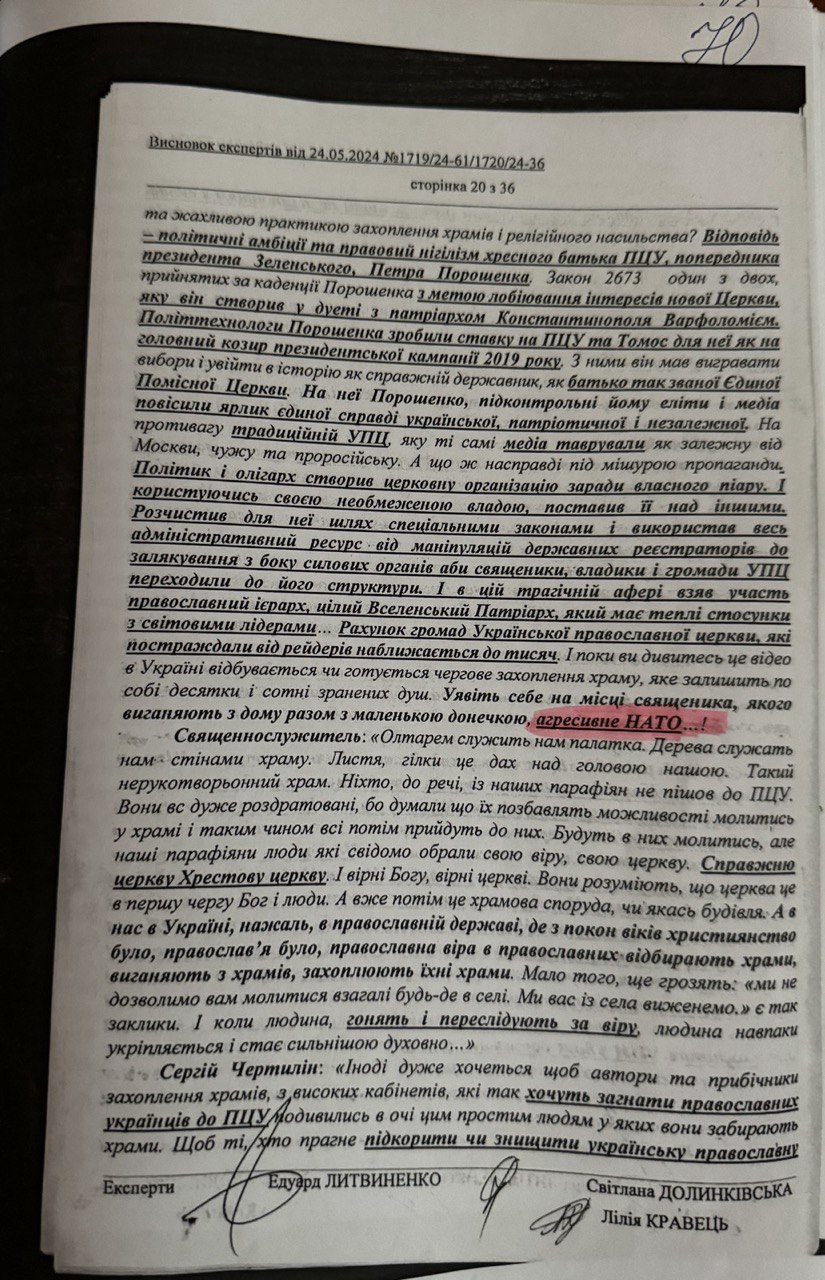
What kind of experts make their conclusions based on machine translations from YouTube, which transcribes speech into text? This is precisely why such nonsense occurred. Some might find this a laughable blunder, but for Fr. Serhiy, it is far from funny, as he has been behind bars for three months due to such blunders, with no clear release date in sight.
Participation in a criminal organization?
This charge logically follows from the assertion that all the news materials mentioned in the "Suspicion" are evidence of "criminal" activity. And if they appeared on the pages of a news outlet, i.e., an organized structure, then that constitutes a "criminal organization." But the SBU investigators went even further, claiming that the "criminal organization" was disguised as three registered informational entities. Quote: "The criminal organization, created [...] for the purpose of concealing criminal activities, used officially registered business entities associated with the media sector..." According to the SBU, these entities were:
Pershy Kozatsky (First Cossack – Trans.) news agency;
Union of Orthodox Journalists;
Myriany (Laity – Trans).
These accusations, based on routine journalistic activities, exemplify an alarming and unjust prosecution of individuals for merely performing their duties as journalists. There is no evidence that these three information resources belong to a single organization, presented neither in the "Suspicion" nor in the court hearings. Surveillance, external observation, meetings, passwords, etc. – none of this exists. The fact that all three resources defend the UOC does not make them an organization, let alone a "criminal" organization. The "Suspicion" briefly raises claims against all three media resources, filled with the word "criminal", without providing evidence. Regarding the "criminal" nature of the Union of Orthodox Journalists (UOJ), it specifically states:
"Union of Orthodox Journalists", headed by A. Ovcharenko and V. Stupnitsky. The information resource is systematically used for publishing distorted information, and it is also duplicated on other resources controlled by the UOC and ROC, including Russian federal channels."
So, there are two claims against the UOJ: that it distorts information and that other resources quote it. First, all UOJ news reports adhere to journalistic standards: information verification, source citations, and supporting photos and videos. This can be confirmed by simply reading the news feed. It is not inferior in quality to the news feeds of other agencies, both religious and secular, domestic and foreign. Second, if a news agency regularly publishes distorted information, as the SBU claims, civil lawsuits are filed against it by those affected. But we do not observe anything like this. There are no court rulings declaring any specific UOJ publication false. Third, neither the UOJ nor any other news agency in the world can prevent others from reprinting or duplicating its information. Once information is published, it becomes public, and its dissemination can no longer be controlled. The UOJ is quoted in many countries, and this is not a crime.
Naturally, any news agency is an organized structure whose task is to collect and disseminate information, and no one would think of accusing it of being organized and spreading information, as this is its goal and a realization of the constitutional right to freedom of speech.
For comparison, the organization called "Kvartal 95", once led by current President V. Zelensky, heavily criticized the authorities and openly mocked P. Poroshenko and his Tomos initiative for the OCU. All these videos can easily be found on YouTube. In a famous scene, he referred to "Tomos" as "thermos" and barked like a dog when trying to pronounce "autocephaly". Why hasn't anyone opened cases for insulting state attributes? These plots, like others of the same ilk, resulted from prior collusion by a group of people, namely, the "Kvartal 95" studio.
Justification and denial of armed aggression by the Russian Federation?
This accusation is also based on UOJ news materials. Here is one example from the "Suspicion".

How can a news report about foreign government officials visiting a UGCC church undermine Ukraine's national security? It is sheer absurdity! But this is why people have been thrown in jail. The other "evidence" is of similar quality. But even these do not fit the definition of Article 436-2, which is titled: "Justification, recognition as legitimate, denial of the armed aggression of the Russian Federation against Ukraine, glorification of its participants". In the given example, there is no mention of the Russian Federation at all.
Treason?
Finally, the most severe charge – treason. In the "Suspicion," there is a complete lack of evidence directly tied to this article. At the end of the list of news materials and the assertion that the examination found them inciting religious hatred or denying Russian aggression, there is a phrase: "Thus, <...> is suspected of treason."
The definition of Article 111 "Treason" is as follows:
"1. Treason, that is, an act intentionally committed by a citizen of Ukraine to the detriment of the sovereignty, territorial integrity and inviolability, defense capability, state, economic or information security of Ukraine: going over to the side of the enemy in a time of armed conflict, espionage, providing assistance to a foreign state, foreign organization or their representatives in conducting subversive activities against Ukraine."
How news publications, which, we repeat, were not fabricated by the accused journalists but were coverage of actual events, could be considered "treason" is unclear. The accusation under this article becomes even more incomprehensible when referring to the Scientific-Practical Commentary of the Criminal Code of Ukraine, which should be the reference book for any law enforcement officer. The commentary on Article 111 states: "From the subjective side, treason is characterized by direct intent. An essential sign of treason is the goal – to cause harm to the sovereignty, territorial integrity and inviolability, state, economic or information security of Ukraine." How can it be said that journalists, publishing reports, for example, about foreign officials visiting a UGCC church in London, had the direct intent to harm the sovereignty of Ukraine? This is utter nonsense! There is no other "evidence" of treason in the journalists' and priest's case besides UOJ's news publications.
At one of the court hearings, A. Ovcharenko even cited statements by SBU head V. Maliuk as an argument. "Regarding Article 111, even SBU head Maliuk, talking about collaborationist activities during martial law, states that the only proof can be a proven fact of cooperation with official representatives of a foreign state. In our case, this is the Russian Federation. There is no confirmation in the texts of suspicions and petitions, as there was none, and still is none," said the journalist.
Perhaps the only hook for SBU investigators to prosecute journalists for treason lies in the words of Article 111 about the threat to "information security of Ukraine".
The definition of what is considered information security of Ukraine is contained in the Presidential Decree of Ukraine dated October 15, 2021, "On the Information Security Strategy of Ukraine".
"Information security of Ukraine is an integral part of the national security of Ukraine, the state of protection of state sovereignty, territorial integrity, democratic constitutional order, and other vital interests of the individual, society, and the state, ensuring the constitutional rights and freedoms of the individual to collect, store, use, and disseminate information, access to reliable and objective information, and the existence of an effective system of protection and counteraction to harm through the dissemination of negative information impacts, including coordinated dissemination of false information, destructive propaganda, other information operations, unauthorized dissemination, use, and violation of the integrity of restricted information."
This definition is not characterized by clarity of wording, but even it indicates that the information security of Ukraine lies not in concealing information, but on the contrary, in ensuring that everyone can exercise their constitutional right to collect, store, and disseminate reliable information.
Conclusion
To conclude this extensive analysis of the evidentiary basis for the charges against the journalists, it would be apt to quote A. Ovcharenko from one of the court hearings: "A journalist is obliged in virtually any country to question the actions of their government. And this has nothing to do with treason. But the investigation believes otherwise."
There is not much to add. A review of the charges brought against the journalists and the priest, as well as video recordings of the parties' statements in the court sessions, allows for a clear conclusion: the journalists and the priest are being prosecuted for nothing other than their journalistic activities aimed at protecting the Ukrainian Orthodox Church.











